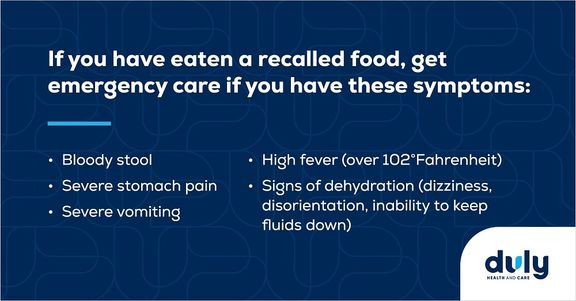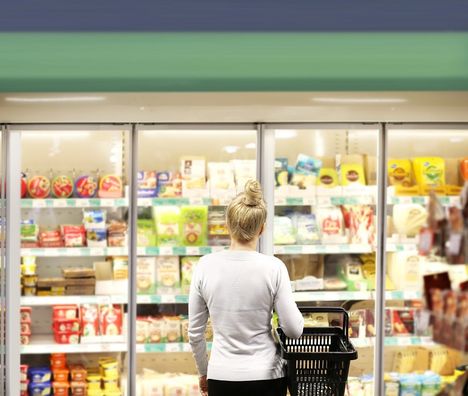What do McDonald’s quarter pounders, Boar’s Head meats, and cucumbers all have in
common?
In 2024, these foods were just some of the ones that were recalled.
The past year saw a flood of food recalls. But what exactly does that mean – and is the number of recalls truly increasing?
Here are answers to common questions about food recalls and how you can stay safe
What Does It Mean for a Food to Be “Recalled”?
A food recall is a method of removing or fixing foods that go against the US Food and Drug Administration (FDA)’s regulations. These foods have safety issues that could put people at risk for foodborne illness. Foodborne illnesses are diseases that arise from eating food contaminated with viruses, bacteria, parasites, or chemical substances.
Foodborne illness is sometimes referred to as “food poisoning,” but that doesn’t tell the whole story. Food poisoning is a form of foodborne illness – however, there are other foodborne illnesses that aren’t considered poisoning.
How Serious Is Foodborne Illness?
It depends on the disease-causing organism, but foodborne illness can be quite serious. Some organisms can cause mild symptoms, such as upset stomach or a low fever. But others can cause severe side effects, like seizures or complications during pregnancy. And in the most serious cases, they can cause organ failure or even be life-threatening.
While the elderly, very young children, pregnant people, and people with weakened immune systems have a higher risk for serious consequences, foodborne illness can be dangerous to anyone. That’s why it’s so important to pay attention to recalls and to not eat foods that have been recalled, even if you’re not in a high-risk group.
Also read: Probiotics and Prebiotics: Helpful Bugs for Your Gut
What Causes Food Contamination?
Food contamination can happen at any time before it gets to your plate. For example, some contamination is environmental, meaning it comes from problems with pollution in water, air, or soil. There are also human errors that can lead to contamination, like unsafe processing or food storage.
There are many contaminants that can cause foodborne illness. According to the FDA, the most common ones are:
- Norovirus (main cause of foodborne illness from contaminated food and water)
- Salmonella (most common cause of bacterial food poisoning in the US)
- E. coli bacteria
- Campylobacter bacteria
- Hepatitis A virus
Listeria isn’t quite as common, but it’s an important one to learn about, as it’s one of the main causes of death from foodborne illness.
Questions about food safety? Your primary care provider is a great place to start. Schedule an appointment with a Duly Health and Care primary care provider
What Should I Do If I Have Food at Home That Gets Recalled?
In addition to not eating the food, there are several steps to take when a food is recalled:
- Ask the store where you bought it if you can bring it back for a refund.
- If you can’t bring the food back, wrap it before you throw it out so that no one else
(including pets) can accidentally eat it. - Wash any surfaces (like refrigerator shelves or countertops), cutting boards, utensils, or cooking equipment that came in contact with the food.
- Sanitize them with a mixture of a gallon of hot water to one tablespoon of
chlorine bleach and dry them off with a paper towel or clean cloth that hasn’t
been used. - Wash your hands thoroughly after cleaning and sanitizing.
- Sanitize them with a mixture of a gallon of hot water to one tablespoon of
What If I Already Ate the Food?
Don’t panic – the recall isn’t a guarantee that you’re going to get sick. If you don’t have
symptoms, you don’t typically need to get tests or medical treatment. If you’re pregnant and have eaten the food and develop flu-like symptoms within two months of doing so, let your provider know.
If you do have symptoms or think you have a foodborne illness, let your provider know. Mild symptoms like nausea, stomach cramps, diarrhea, low fever, or headache can often be treated with rest, liquids, and over-the-counter medication. They usually go away within a few days, but you may need more advanced care if they last longer.
Eating recalled food when you’re pregnant, receiving cancer treatment, have an ongoing
condition like diabetes, or are in the high-risk age group (young children, infants, and older adults) warrants an office visit with your primary care provider.
Some symptoms of food poisoning require emergency care, since they can cause permanent damage or be fatal if not treated right away.

Also read: Nausea, Vomiting, Diarrhea: What Should Actually Send You To Immediate Care?
Why Does It Seem Like Food Recalls Are on the Rise?
Food recalls have become more common in the news, but that doesn’t necessarily mean they are increasing. One reason we’re seeing more of them is that methods and technology for detecting contaminated food have improved, so we’re catching them more often. Also, problems with food safety occur randomly. It could be just a coincidence that a few have recently happened around the same time.
Also read: Bird Flu Explained: Symptoms, Spread, Prevention, and Vaccine Updates
How Can I Learn If a Food Is Being Recalled?
For some major recalls, you’re likely to hear about them on the news or circulating on social media. There are also ways to stay on top of recalls, including:
- Downloading an app (some send push notifications when there are new recalls)
- Checking the FDA safety alert site
- Signing up for alerts from the FDA’s and the United States Department of Agriculture (USDA) Food Safety and Inspection Service’s X/Twitter accounts (@FDArecalls and @USDAFoodSafety)
- Asking about and signing up for automated recall notifications from grocery stores you shop at
While it’s very important to take recalls seriously, you can still rest easy. The FDA has plenty of safeguards in place to make sure that the food we eat is safe – and recalls just mean that the system is working.
Health Topics:








